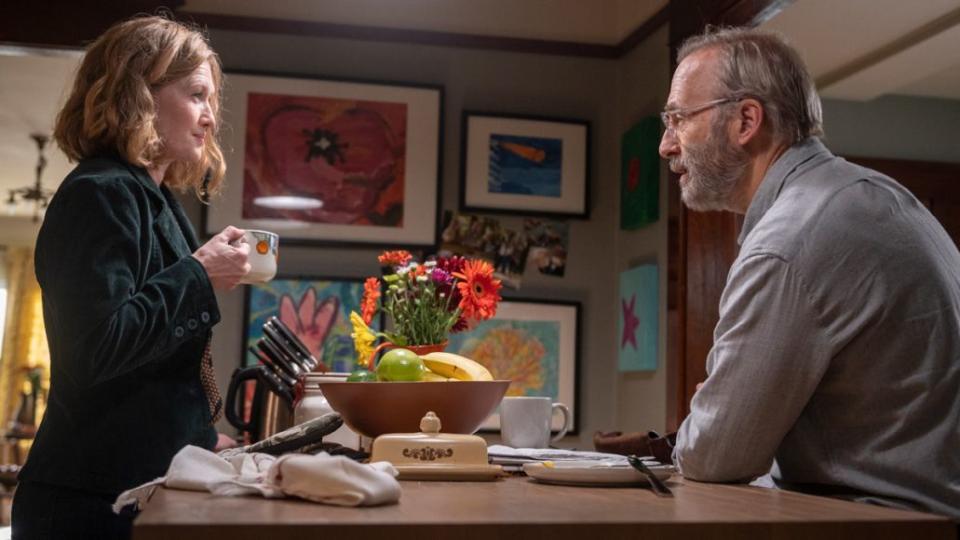Lucky Hank Review: Bob Odenkirk Leaves Saul Goodman Behind for AMC’s Thin Academic Comedy
- Oops!Something went wrong.Please try again later.
- Oops!Something went wrong.Please try again later.
The post Lucky Hank Review: Bob Odenkirk Leaves Saul Goodman Behind for AMC’s Thin Academic Comedy appeared first on Consequence.
The Pitch: William Henry Devereaux Jr. (Bob Odenkirk) — our titular Hank — is the chair of the English department at Railton College, a small and less-than-reputable academic institution prone to nurturing mediocrity. At least, that’s what Hank tells his students during a creative writing class one day, after being provoked by a student who refuses to acknowledge criticism of his technically poor writing.
Hank’s rant becomes campus-wide news fast, but it’s just one of many things on Hank’s mind: While he and his wife Lily (Mireille Enos) have a deep and loving relationship, his adult daughter Julie (Olivia Scott Welch) hasn’t quite gotten the hang yet of growing up. And there’s also the news that Hank’s father, a legendary writer and critic in whose shadow Hank has always struggled to find his own light, is retiring — and wants to speak to his son, though their estrangement is pretty intense. It all adds up to a dissatisfaction with his life that could boil up into crisis, especially as his fellow English professors consider removing Hank from his position as chair…
Higher Learning: Academia, especially for those studying the liberal arts, on the surface often seems like a peaceful place, an opportunity for students to grown and learn, for professors to nurture their nascent reasoning instincts as part of an ongoing exchange of ideas. Yet, when discussing Lucky Hank, the first thing we must do is refer back to Sayre’s Law, a concept credited to political scientist and Columbia University professor Wallace S. Sayre which boils down to “The politics of the university are so intense because the stakes are so low.”
While centered on academia, it’s a concept that applies to any small community or subgroup, especially when hierarchies and competition are a factor — outsiders might look at the internal conflicts which emerge within a friend group or collection of co-workers or hobby club and wonder how things got so heated… But when you’re inside it, it’s hard not to see perceived slights as grievous wounds, and the battles as life-or-death.
That lack of perspective offers up some rich comedic potential, though translating that potential to the screen is tricky. There haven’t been a lot of films or TV shows made that truly dig into the world of academia from the professor’s perspective, with some of the most prominent examples being Good Will Hunting and Netflix’s The Chair, and the reason for that is a typical professor’s life does, in fact, lack the drama of a much grander story.
That’s the hurdle faced by Lucky Hank, based on the novel Straight Man by Richard Russo (a Pulitzer Prize winner for his book Empire Falls) — its translation to the screen feels very much like a novel written by a Pulitzer Prize-winning author, full of nuance and intriguing characters and great wit… and stakes as thin as newsprint.

Lucky Hank (AMC)
The Faculty: In the first two episodes provided to critics (and premiering this weekend at SXSW), there’s a lot of charm to appreciate in Lucky Hank, almost entirely due to the cast. Odenkirk’s first major follow-up to Better Call Saul requires him to use a completely different set of acting muscles than his critically lauded work on that series; watching him deliver a scathing monologue here makes you appreciate just how talented an actor he is, because it’s completely different from how Saul Goodman would tear into a person, yet equally devastating.
In addition, showrunners Aaron Zelman and Paul Lieberstein have surrounded Odenkirk with a strong ensemble including Diedrich Bader, Oscar Nunez, Suzanne Cryer, and Cedric Yarbrough, all of whom bring very different comedic voices to the infighting that occurs in their faculty lounge. Particularly fascinating is Shannon DeVido as a film studies professor whose interest in interdepartmental politics is minimal; despite limited screen time, DeVido’s dry, sharp delivery made a huge impact during her appearances on comedies like Difficult People and The Other Two, and it’s a genuine pleasure to see her get a larger platform here.
Meanwhile, Lucky Hank does its best to avoid the trope-turned-trap of a supportive wife with no interior life of her own; the character of Lily feels under-explored so far, but Enos brings such spark and life to her that she’s almost instantly one of the most likable characters in the show, if not television flat out. It’s also a welcome change of pace to see her and Hank in a relatively happy marriage, even when she struggles with Hank’s choices and behavior.
The Verdict: There’s an unplanned timeliness to Lucky Hank, as The New Yorker literally just ran a lengthy exploration into “the end of the English major”; the great existential question at the heart of the show is whether or not anything Hank does really matters, especially as a writer whose one novel failed to really launch his career.
The comedy that comes in the English department’s interactions, or in the gentle wit of Hank and Lily’s conversations, makes the series a light and enjoyable watch. But it might, appropriately enough, be the television equivalent of earning a BFA — important in the moment, but unessential after the fact.
Where to Watch: Lucky Hank premieres Sunday, March 19th on AMC+ and AMC.
Trailer:
Lucky Hank Review: Bob Odenkirk Leaves Saul Goodman Behind for AMC’s Thin Academic Comedy
Liz Shannon Miller
Popular Posts
Stevie Nicks Delivers Tearful Tribute to Christine McVie with "Landslide" Performance: Watch
The Cure Announce Ticket Policy to Ensure "Affordable" Pricing for Fans
Every Oscar Best Picture Winner Ranked: From Argo to The Life of Emile Zola
Jamie Lee Curtis Says It's Time for Matinee Concerts: "I Want to Hear Coldplay at 1:00 P.M."

